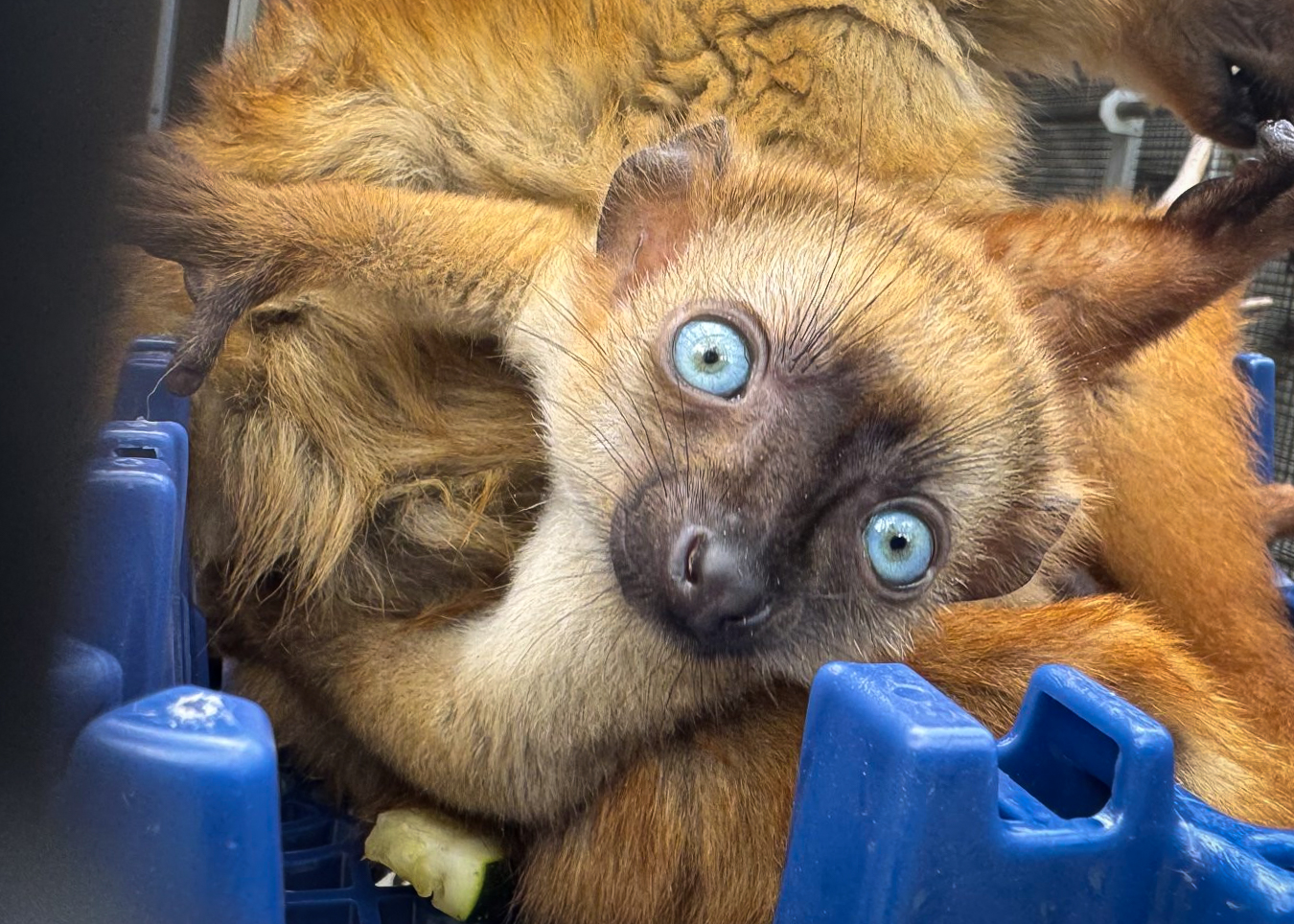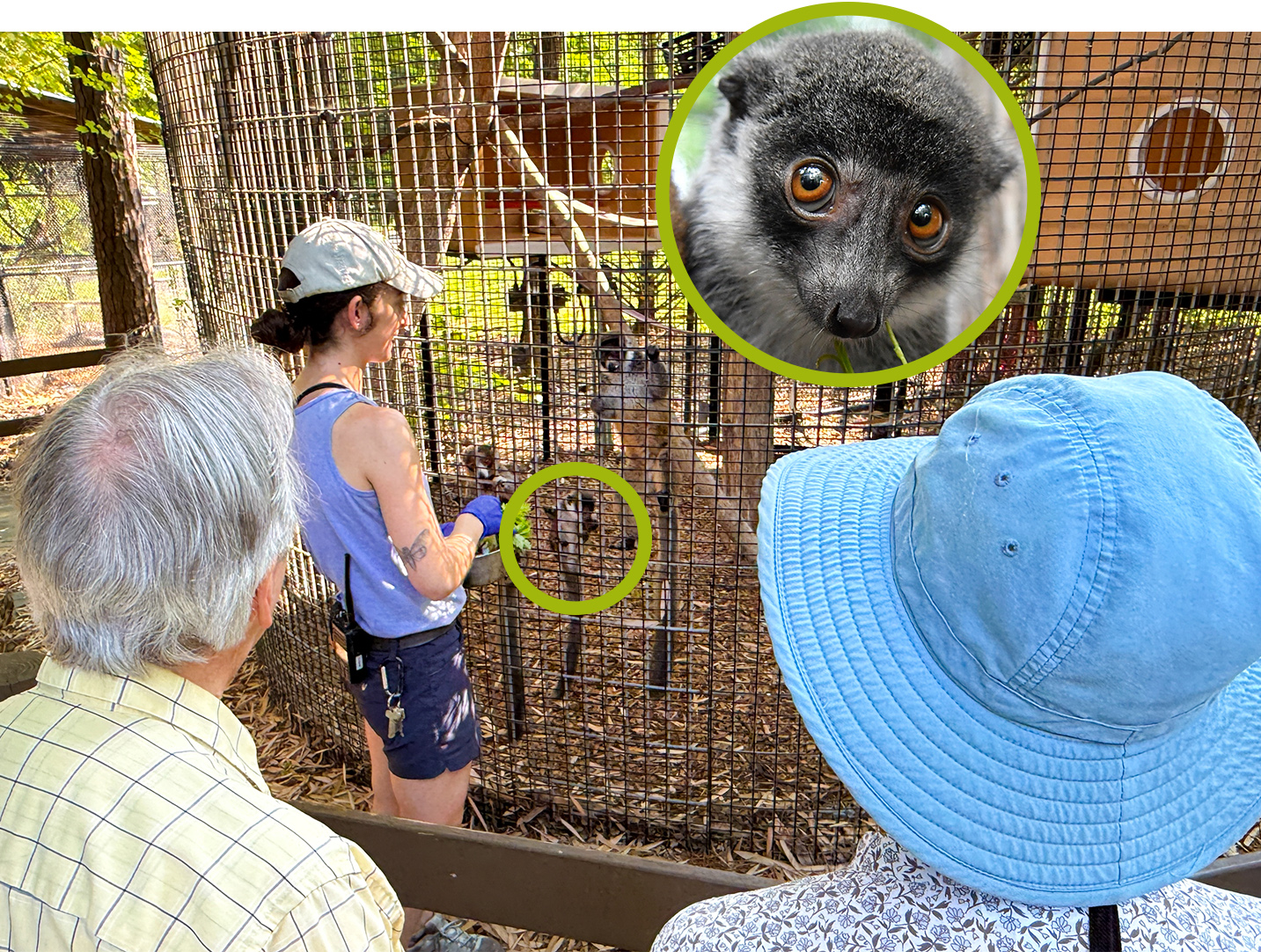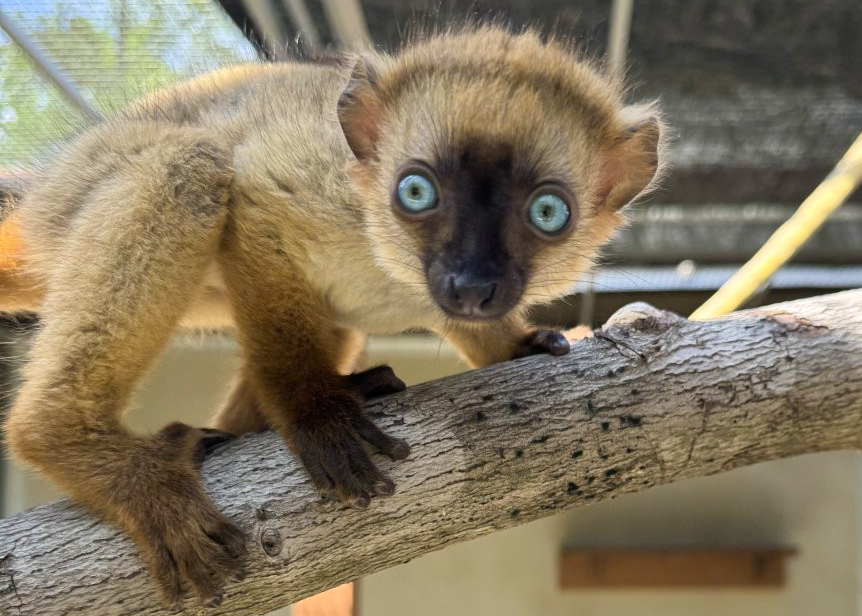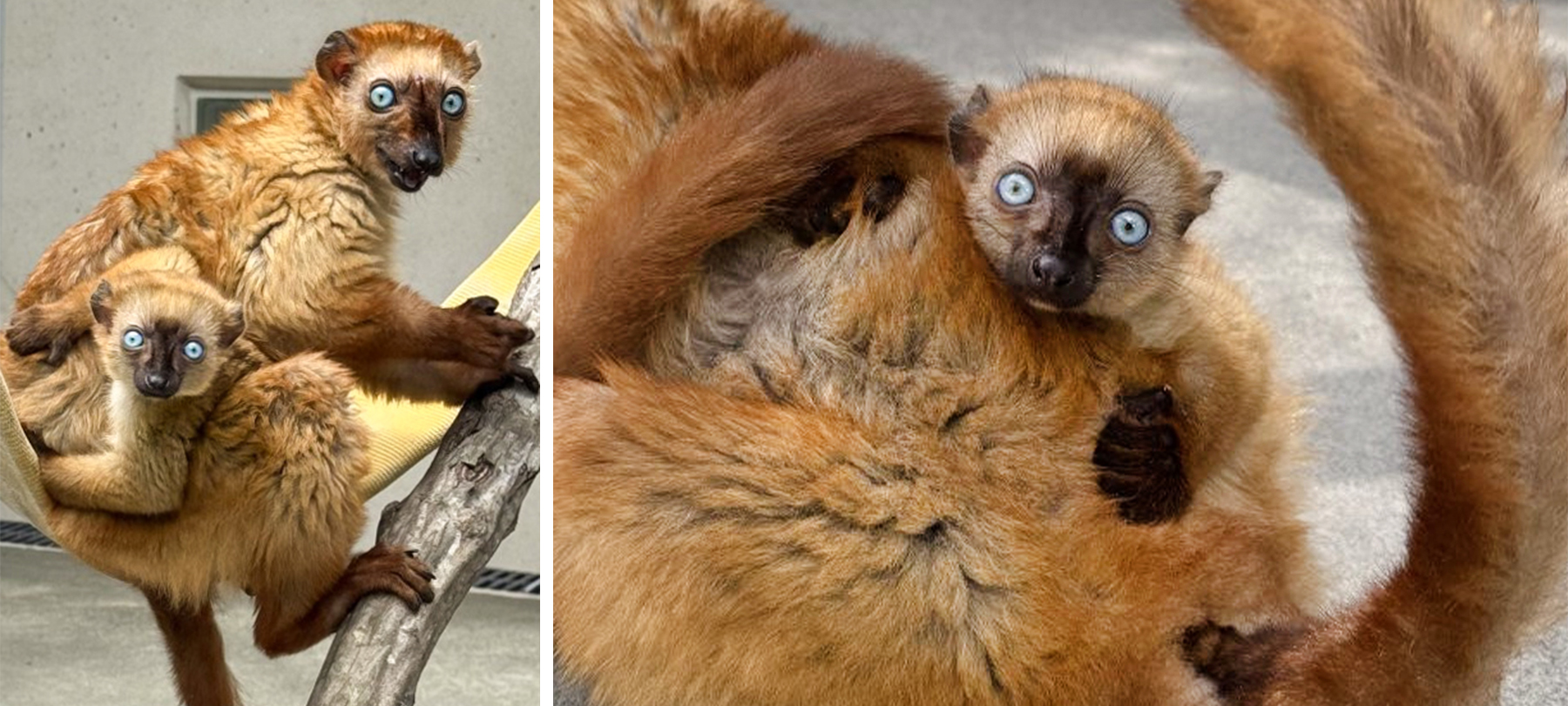
Mitsiky, a critically endangered blue-eyed black lemur whose name means “smiling” in Malagasy, is the only infant of her species this year in human care, in any facility in the world. Photo by Madison.
When it comes to naming opportunities in connection with a generous gift, could anything be better than naming a lemur? The Lemur Center’s new Ultimate Adoption Package was designed as a limited-time opportunity for our supporters to do something extra special: to name one of our lemur infants by making a new gift of $20,000 to our Animal Care Fund or our General Fund. These tax-deductible gifts directly support the DLC’s operations and the care and wellbeing of our colony of Earth’s most endangered mammals.
We’re thrilled to share that our first donors to come forward to claim an Ultimate Adoption are Cindy and Tom Cook! Cindy and Tom have lived near the Lemur Center for more than 25 years and have always appreciated it as a special place. Yet it was not until a friend of theirs, DLC education volunteer Cindy Richards, shared with them the Adopt a Lemur program’s promotion to “name a baby lemur” that they considered making a significant donation.
When she and Tom shared their interest in the opportunity, they were treated to a visit with all of the eligible infants in order to select their favorite. Unbeknownst to them, the Lemur Center had recently decided to add another infant to the list of eligible infants: a critically endangered blue-eyed black lemur infant—the only infant of her species this year in human care, in any facility in the world.
“She looked at me with those big blue eyes and it had to be her,” said Cindy, who added with a smile that that she was a blue-eyed, too. She also shared that she was touched to see how much the technicians who introduced her to each infant care for their lemur families.
“I was so impressed with the information Madison [one of the technicians who cares for Mitsiky’s family] was sharing, and it was easy to feel her passion and love for her work and the animals.”

Cindy and Tom enjoyed visiting all of the eligible infants in order to select their favorite. Here, Primate Technician Supervisor Madison introduces them to Bonita’s adoptable infant—the bouncy, beautiful superstar of the DLC’s summer tour path. Photos by Mary Paisley (primary) and David Haring (inset).
While still touring the center and meeting other lemurs, Cindy and Tom shared that they had decided to let the technicians choose the name. So, in a spirit of collaboration, the team who care for Charlie’s family got together and came up with a list of four names to propose to Cindy and Tom, who enjoyed selecting “the” name in this way.
“The name ‘Mitsiky’ means ‘smiling’ in Malagasy,” Cindy explained. “Charlie and her infant are known amongst the staff for their upturned lips that make it look like they’re smiling. She makes us smile, too, so the name was just perfect!”
Meet Mitsiky!
Mitsiky has been a go-getter since the day she was born! First-time mom Charlie gave birth on March 6, 2025–one day before her official baby watch window–to a bright, healthy infant. Dad Mangamaso is an experienced father, having raised two daughters with Velona, his previous breeding partner.
Mitsiky is every bit her mother’s daughter. Keepers who care for the family describe her as spunky, adventurous, and curious—just like mom! From a young age, she’s been eager to try new things and explore her enclosure on her own, with close supervision from mom and dad. At four months old, Mitsiky is so independent that she regularly spends time playing and exploring on the opposite end of her enclosure, unconcerned that her parents are nowhere nearby. Her favorite food is grapes, and she will regularly try to steal them out of mom’s hand!
Dad Mangamaso (whose name means “blue eyes” in Malagasy) was born at Parc Ivoloina, a nonprofit nature center in eastern Madagascar. In 2017, Mangamaso and his female companion Velona traveled 9,000 miles across land and sea to the Duke Lemur Center. Prior to the arrival of Mangamaso and Velona, every blue-eyed black lemur in North America descended from seven wild-born animals imported by the Duke Lemur Center in 1985 and 1990.
Blue-eyed black lemurs are among the most endangered primate species in the world, with possibly fewer than 1,000 individuals remaining in the wild, so maintaining a genetically diverse population of these lemurs in human care is a crucial safety net. Through two daughters with Velona and this infant with Charlie, Mangamaso plays a valuable role in the survival of this critically endangered species.
Mangamaso has contributed more than just genetics to this little lemur. He has been incredibly respectful of Charlie’s space and has participated in rearing as much as she will allow. When Mitsiky was about one month old, keepers observed her clinging to Mangamaso rather than Charlie in multiple instances. While dads of many lemur species will participate in infant care, this level of care is relatively uncommon for blue-eyed black lemur sires.
Mitsiky is the only blue-eyed black lemur infant this year in human care, in any facility around the world. With a father from Madagascar and a mother descended from generations of lemurs in North America, she is a testament to the Duke Lemur Center’s dedication to caring for and conserving the world’s most endangered group of mammals.

Spunky, adventurous, and curious, Mitsiky is already so independent that she regularly spends time playing and exploring on the opposite end of her enclosure, unconcerned that her parents are nowhere nearby. Photo by Madison.

“It was easy to feel [the technician’s] passion and love for her work and the animals,” says Cindy. “We also recognize the importance of the natural habitat for the lemurs and how both the Lemur Center and Duke Forest provide green space in this largely urban area. Protecting the land is important, too.” Pictured: Mitsiky clings to her mother, Charlie. Photos by Madison.
Ultimate Adoption Program
We still have adoptable infants waiting for names—and YOU could be the one to name them! With a tax-deductible donation of $20,000 (payable in two installments), you—or your family, company, organization, etc.—can symbolically adopt and name a little lemur. Your donation contributes to the care of the infant, her family, and all of the other lemurs who reside in our colony, as well as the conservation of the most endangered group of mammals in the world!
Adoptions include quarterly email updates, complete with social media-worthy photos and videos, and a visit to the DLC to meet your adopted infant. Visit the Ultimate Adoption homepage to learn more, or email us directly at adoptalemur@duke.edu if you’re ready to make a contribution!
Looking for additional ways to support the DLC? To explore the ways you can help with a tax-deductible donation, please visit our SUPPORT US page.

